Article
Despite an increased focus on sustainability, the beauty and skin care industries are not doing enough to address waste, say critics.
Just as it is in apparel, waste is built into beauty’s business model. However, most work to eliminate waste has so far been connected to packaging, while overlooking other sources. Waste is generated by formula testers, unsold or returned products and items that expire in warehouses or on store shelves. Compounding the problem is the lack of data on how much actually gets wasted, as well as a lack of solutions for managing that waste better. With retailers sending unsold inventory back to brands; expired or discontinued products being sent to the landfill; and unused products sitting in customers’ homes, it’s impossible to pinpoint the true numbers of the beauty industry’s waste. Arnaud Plas, co-founder and CEO of Prose, says he’s done his own research and estimates that between 20 and 40 per cent of beauty products, depending on the category, end up as waste.
What’s clear, according to multiple industry experts, is that it’s a massive amount, and some say the industry is intentionally not tracking its waste.
A handful of emerging brands, specialising in personalised, made-to-order beauty products, such as Prose and Pure Culture Beauty, say their models can help to reduce the problem. Their potential for impact relies not just on consumer buy-in, but also on the ability to shift the industry more broadly. Custom production that simply provides another avenue for people to buy more products is unlikely to reduce overall waste, but if it helps to nudge the industry to rethink how it operates and encourages consumers to demand change from their favourite beauty brands, the companies offering personalisation may be onto something.
“We talk a lot about the fashion industry when it comes to waste, or food, but the beauty industry has to also do its own self-criticism and analyse how they’ve been operating for years,” says Plas.
The approach to personalisation
Pure Culture pitches itself as a science-based skincare maker. An at-home test kit collects information about a customer’s pH balance, living bacteria of their skin and other variables. This information is then combined with the results of a questionnaire about lifestyle factors, such as diet and sleep, to determine personalised formulations for products including cleansers and moisturisers.
“Sustainability is so much more than just the packaging and what’s in the product. It’s all the behaviors that we have created for the consumer that has ended up in a lot more waste,” says Pure Culture CEO and co-founder Joy Chen.
Brooklyn-based Prose takes a similar approach to haircare. The process starts with a consultation that covers 85 factors, from diet and stress to environment and allergies. Plas says Prose was founded with the dual purpose of reducing industry waste and offering more positive messaging for consumers in the process. They avoid typical broad categories — curly or straight hair, dry or oily — in favour of addressing multiple needs at once, as well as the root cause of hair issues.
“There are tons of reasons that can lead to dry hair. It could be because you've had colouration for years, it could be because you're going to the swimming pool every day,” says Plas. “Knowing that is very important for us to find the right ingredient to protect your hair from dryness.”
By only making products once people order them, he says, Prose also avoids both retail forecasting, which is what often results in unsold inventory at stores, and creating products that customers buy and then discard because the formula is not effective for their specific hair. “[Brands] produce, let's say two million units of shampoo for people with long hair or curly hair, and then they try to find them,” he says. “It’s more like a long-lasting relationship that we’re building with our customers,” says Plas. “It’s fine-tuning your product versus trashing it.”
Understanding beauty’s waste problem
LVMH-owned Sephora declined an interview request and declined to provide figures on product waste generated in its stores. Beauty retailer Ulta would not share figures on unsold inventory or returned products, but a representative said it guides customers on product selection to minimise returns. Its virtual try-on service, for example, “helps guests virtually try on thousands of beauty products… allowing discovery and testing to reduce individual product waste and reducing return rates from online orders”.
The industry produces other forms of waste, and there, different startups offer a growing range of solutions. UpCircle Beauty makes formulas with ingredients from food companies that were being discarded — repurposing 8,000 mandarin oranges to date for its toner, for example, and over 350 tonnes of used coffee grounds in its eye cream and other products, according to the company. Packaging is a challenge in itself, and companies are increasingly offering refillable products as a solution. This month, beauty brand Trestique transitioned its entire product line to a refillable system, which founder and co-CEO Jenn Kapahi says will reduce both packaging and product waste because it encourages, or reinforces, the shift in people to only buy what they will actually use.
Credo Beauty has been working to reduce its total waste footprint — including packaging, but also other single-use items such as sample packets, makeup remover wipes and sheet masks. “Those were huge, huge drivers of our business. We replaced it with brands that are creating things that aren't single-use and are packaged more responsibly,” says Annie Jackson, Credo co-founder and COO — suggesting a mud mask instead of a sheet mask, for example.
The retailer announced it had completed the phase-out of all single-use products on 1 June after a two-year process. “Anything that’s used once — gone,” she says, adding that they have seen no impact to the business. But that wasn’t a guarantee. “I was terrified. I'm not going to lie — when we added up the revenue of what we are taking away, it was a really big number. I just felt like if we weren't taking big risks like that, then we weren't doing anything to further the conversation.”
The custom brands hope that the larger retail landscape is somewhere they can also make a difference. “What we wanted to create was basically a new operating model, moving from mass production and consumer segmentation to personalisation and made-to-order production,” says Plas.
Scalable model, scalable impact?
For custom production to make a dent in the waste problem, it has to have an impact on how the rest of the industry operates. Otherwise it’s adding on, not replacing — and whether large brands can or will adopt a similar model is unclear.
Plas thinks the potential for impact is significant. “I think our role is just to show that it’s doable and it’s scalable. For years, companies told the market that basically the way they were operating was the only way to operate at scale,” he says. “For us, the goal was really to demonstrate that — no, another way is possible.”
He says he’s seeing increasing signs from “big leading companies” that they are looking at moving into product personalisation. And the space itself is growing, with companies including Function of Beauty, Formulate and Strands offering various forms of customisation.
Pure Culture, which started as purely direct-to-consumer, is already showing signs of scaling. It launched in August with Canadian retailer Hudson’s Bay, which sells the test kit online (expansion to physical stores will depend on pandemic-related variables) and the customer buys the promise of a serum or lotion to be delivered later. Chen says it will likely launch with retailers in the US, including a well-known national chain, next year.
Zooming out, the underlying shift at hand may be towards a more mindful approach to shopping overall.
“The things that we're doing set a standard by which the beauty industry can change, but it also harks back to the idea that we're creating a heritage brand that can grow and is mindful of the environment that it's been launched in,” says Helen Nwosu, VP of social impact at Prose. “We continue to push the envelope, not insofar as what the industry standard is, but what we can provide our consumers and how we can protect the planet.”
Previous article:
[VOGUE] Compulsively Exercising Is A Dangerous Mental Trap (3 years ago)
About the game:

USA as a world power? In E-Sim it is possible!
In E-Sim we have a huge, living world, which is a mirror copy of the Earth. Well, maybe not completely mirrored, because the balance of power in this virtual world looks a bit different than in real life. In E-Sim, USA does not have to be a world superpower, It can be efficiently managed as a much smaller country that has entrepreneurial citizens that support it's foundation. Everything depends on the players themselves and how they decide to shape the political map of the game.
Work for the good of your country and see it rise to an empire.
Activities in this game are divided into several modules. First is the economy as a citizen in a country of your choice you must work to earn money, which you will get to spend for example, on food or purchase of weapons which are critical for your progress as a fighter. You will work in either private companies which are owned by players or government companies which are owned by the state. After progressing in the game you will finally get the opportunity to set up your own business and hire other players. If it prospers, we can even change it into a joint-stock company and enter the stock market and get even more money in this way.
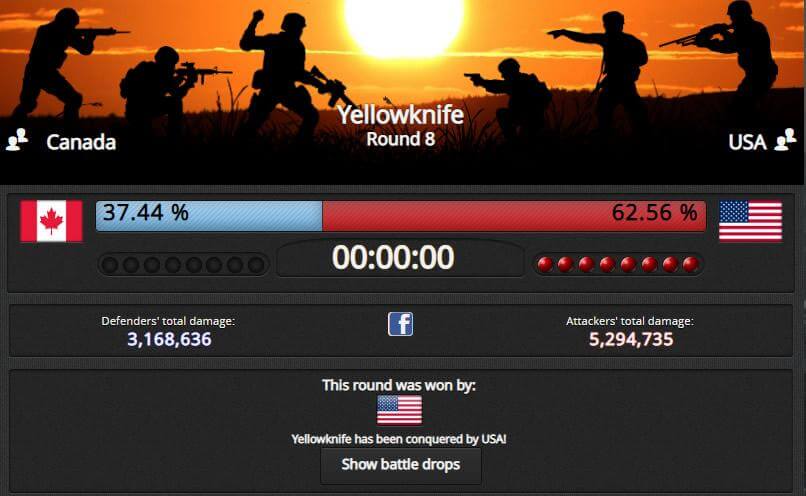
In E-Sim, international wars are nothing out of the ordinary.
Become an influential politician.
The second module is a politics. Just like in real life politics in E-Sim are an extremely powerful tool that can be used for your own purposes. From time to time there are elections in the game in which you will not only vote, but also have the ability to run for the head of the party you're in. You can also apply for congress, where once elected you will be given the right to vote on laws proposed by your fellow congress members or your president and propose laws yourself. Voting on laws is important for your country as it can shape the lives of those around you. You can also try to become the head of a given party, and even take part in presidential elections and decide on the shape of the foreign policy of a given state (for example, who to declare war on). Career in politics is obviously not easy and in order to succeed in it, you have to have a good plan and compete for the votes of voters.
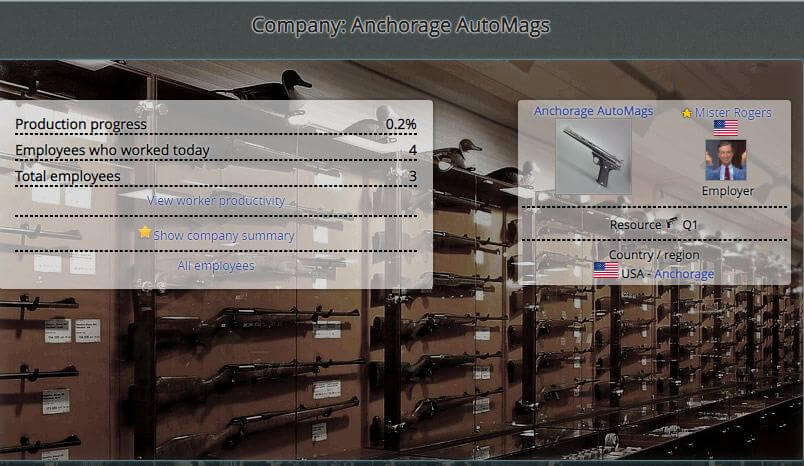
You can go bankrupt or become a rich man while playing the stock market.
The international war.
The last and probably the most important module is military. In E-Sim, countries are constantly fighting each other for control over territories which in return grant them access to more valuable raw materials. For this purpose, they form alliances, they fight international wars, but they also have to deal with, for example, uprisings in conquered countries or civil wars, which may explode on their territory. You can also take part in these clashes, although you are also given the opportunity to lead a life as a pacifist who focuses on other activities in the game (for example, running a successful newspaper or selling products).
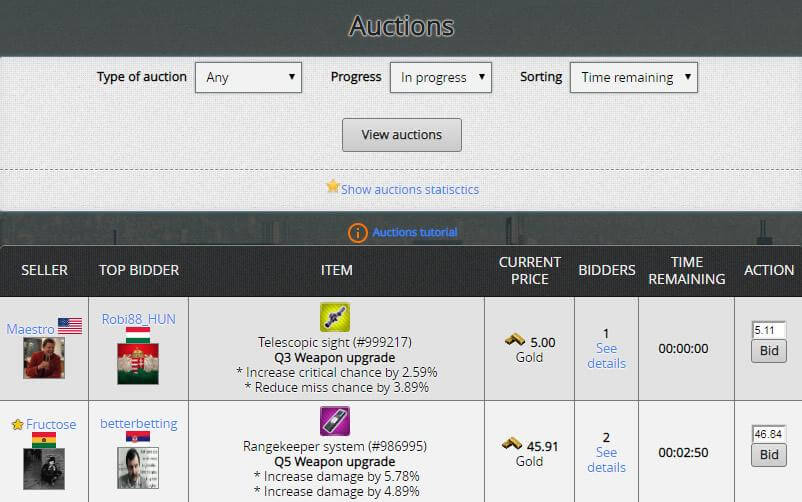
At the auction you can sell or buy your dream inventory.
E-Sim is a unique browser game. It's creators ensured realistic representation of the mechanisms present in the real world and gave all power to the players who shape the image of the virtual Earth according to their own. So come and join them and help your country achieve its full potential.
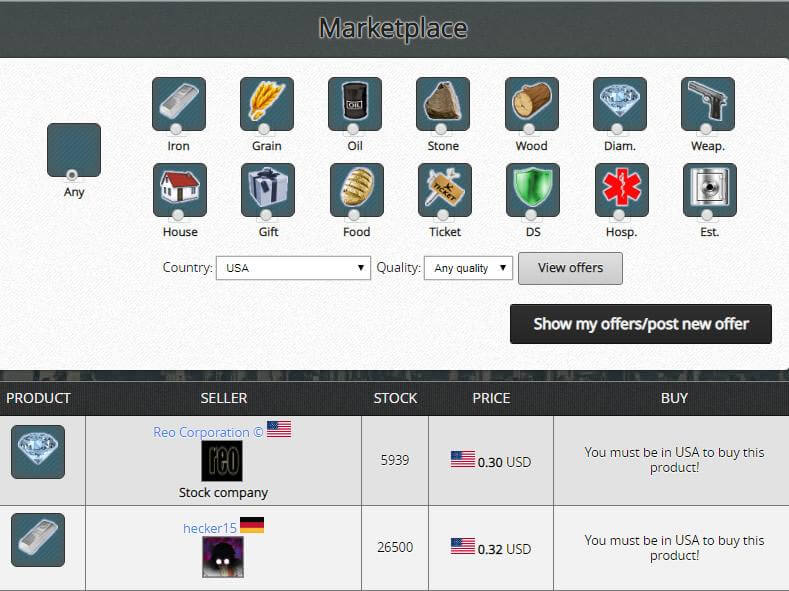
Invest, produce and sell - be an entrepreneur in E-Sim.
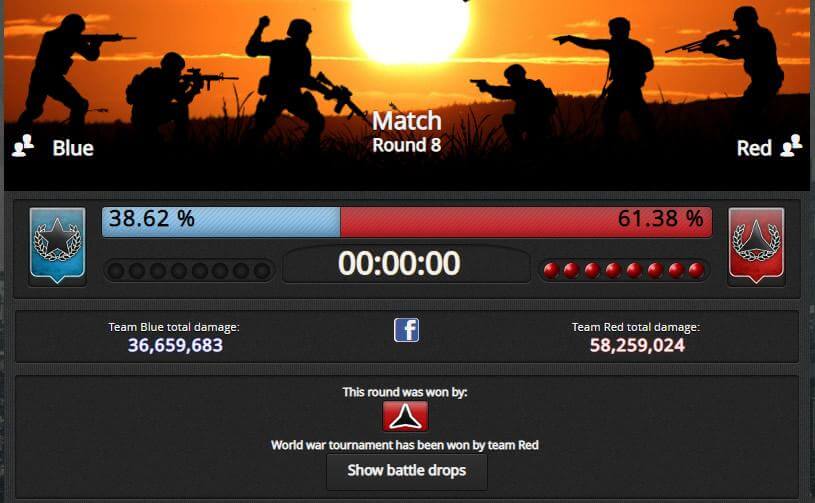
Take part in numerous events for the E-Sim community.
